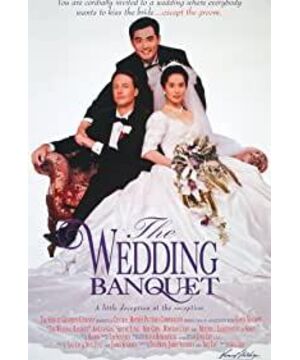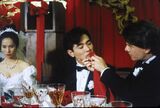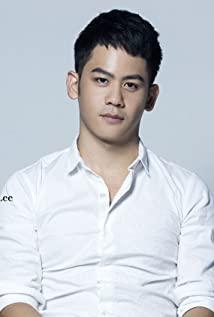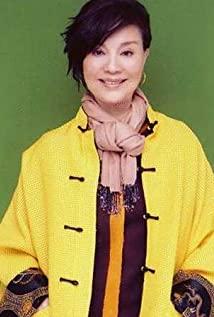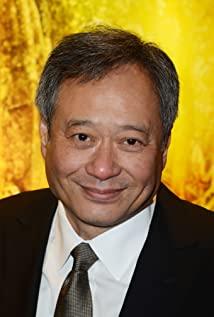One weekend, my mother called me early in the morning and said sourly, "That XXX got married, and his mother specially came to give me candy and souvenirs."
Listening to my mother's repressed and sad tone, and thinking of another person who chose to marry in person, I was not very comfortable.
So he ended the call with haha, and then silently opened Ang Lee's classic "The Wedding Banquet".
The result was full of sadness.
1. Compromise and marriage
Ang Lee, who has been nurtured in traditional Chinese culture, may be the only first-line director who can connect and integrate Eastern and Western cultures.
In the movie "The Wedding Banquet", in order to balance his feelings with the expectations of his parents and family, Gao Weitong (played by Zhao Wenxuan), a gay man living in Manhattan, decides to compromise and marry the illegal immigrant female painter Gu Weiwei (played by Jin Sumei).
Before that, Wei Tong and his gay man Simon (Mitchell Lichtenstein) had already tried their best to hide from their parents.
Gao's father (Lang Xiong) used to be a majestic general of the national army, commanding a dignified teacher of more than 10,000 people. Now he is old and frail but has a hot temper, and he is more and more anxious about Wei Tong's marriage.
Gao's mother (Gui Yalei) signs up for Weitong's high-end mate selection club. As a result, Weitong requires that the woman must be 178 in height, speak multiple languages, have two doctorates, and know opera...
Procrastination to escape, deliberate embarrassment, exhausted all the energy, still can not escape the marriage disaster.
Formal marriage is obviously a good way to kill two birds with one stone - it can not only send away the parents who forced the marriage, but also help Gu Weiwei get a green card. But everything that followed was increasingly uncontrollable.
Wei Tong thought that he only needed to take the time to get a certificate to end the battle happily, but his parents came to New York excitedly to hear the news, insisting on beating gongs and drums to organize a happy event for their son.
After a noisy pure Chinese wedding banquet, under the influence of relatives and friends having a bridal chamber and alcohol, Wei Tong actually had a relationship with Wei Wei and made her pregnant. This induces an emotional crisis between Wei Tong and Simon.
In desperation, Gao's father suffered a stroke and was sent to the hospital, and Weiwei also decided to have an abortion. Sitting outside the ward, Wei Tong, who was devastated, had a showdown with his mother about the fact that he was gay. After listening to the mother, she asked Weitong not to tell Gao's father.
After that, Gao's father also confessed to Simon that he could understand some English, so he actually knew the truth long ago.
"I see, I listen, and I understand." Then he kept silent. This is the way an old Chinese father does things. So Gao's father also asked Simon not to tell Gao's mother this.
The conflict between the modern concept of love and marriage and the traditional Confucian ethical family concept has caused an unpredictable impact on the family's emotions.
2. Lies and decency
In 1993, when "The Wedding Banquet" was released, homosexuality was not generally accepted by the general public even in the United States, where the social culture was already very open.
Even so, compared to the traditional Chinese culture's obsession with the inheritance of clan blood, it is of course a more comfortable choice to stay in the United States.
Mother Gao wanted to keep the child in Weiwei's belly, and tried every means to prevent Weiwei from going out to have an abortion. Father Gao also wanted to hug his grandson, so he always pretended to be deaf and dumb, turning a blind eye to the conflicts that happened under his nose.
Gu Weiwei is obviously a pure modern woman, well educated, with profound artistic cultivation, and she doesn't know anything about housework, so she needs Simon to cover her while pretending to be a good wife and good mother.
Of course, she also longed for her own marriage and love, so she cried a lot when her father told her new daughter-in-law. For such women, choosing to marry a man who does not love each other in exchange for a green card is not a tragedy.
Wei Tong's gay Simon's tolerance for his lover's family cultural background is simply touching. He tried every means to make Weitong and his family look decent, suggested that Wei get married with the same shape, would be skilled in Chinese food, cover for Weitong and Weiwei, prepare a meeting ceremony for Gao's parents, and help Gao's father recover...
In addition to being male, he is almost a perfect "daughter-in-law" character.
Everyone knew, but no one was careful not to talk about it.
"The Analects" says: "The father is hidden for the son, the son is hidden for the father, and it is directly in it." It is a kind of benevolence and righteousness, part of traditional Chinese moral values, and also a traditional Chinese family's way of maintaining superficial peace and decency.
The wedding turned into a precise calculation, each party carefully weighed and carefully planned to make sure that everything was perfect, and finally brought together a seemingly complete "wedding banquet", but in fact everyone was scarred.
3. Tradition and fulfillment
At the banquet, a foreign guest was shocked by the successive marriage ceremonies, and said with emotion, "I thought Chinese people were all silent math geniuses."
For the Chinese, tossing new people to make bridal chambers is a tradition, a "national quintessence" that must be carried forward overseas.
So, director Ang Lee, who was a guest passerby, said something in one sentence:
"You're witnessing the results of 5000 years of sexual repression."
The movie chose a euphemistic comedy ending: Gu Weiwei decided to keep the child, and Simon also agreed to keep the other father of the child. When Gao's father said goodbye at the airport, he said to Simon, "Thank you for taking care of Wei Tong " and to Weiwei, " Thank you, Gao's family. "
Leaving the child fulfilled the Gao family's wish to continue the bloodline, and agreeing with Simon fulfilled the son's feelings. For the parents of the Gao family, this was a happy ending that seemed to have the best of both worlds.
But Wei Wei was crying, Gao's father and Gao's mother were crying, Wei Tong and Simon also had a heavy face, and everyone was full of grief.
If the Gao family's parents really felt that their son's marriage and childbirth were more important than his happiness, they would not have such an expression. If Wei Wei really felt that getting a green card at all costs was more important than her love and marriage, she would not cry so sadly.
It is said that Ang Lee's "The Wedding Banquet" is a movie that all gays who come out of the closet will watch with their parents. But after watching it, I felt very sad, and I also understood why most gay guys dare not come out and watch such movies with their parents.
Because I suddenly remembered that when I was talking about homosexuality, my mother said lightly: "It's okay, homosexuals can also get married and have children."
They probably won't feel that Wei Tong and Simon are wronged, and they won't feel that Wei Wei is pitiful as a co-wife. They may even think that she is very lucky to marry such a family and solve the green card problem. This story is very complete. comedy.
Even though Wei Tong and Simon were reluctant to insert another woman into their relationship, Wei Wei obviously yearned for her own true love and marriage.
Between love and tradition, everyone is clearly compromising.
View more about The Wedding Banquet reviews


